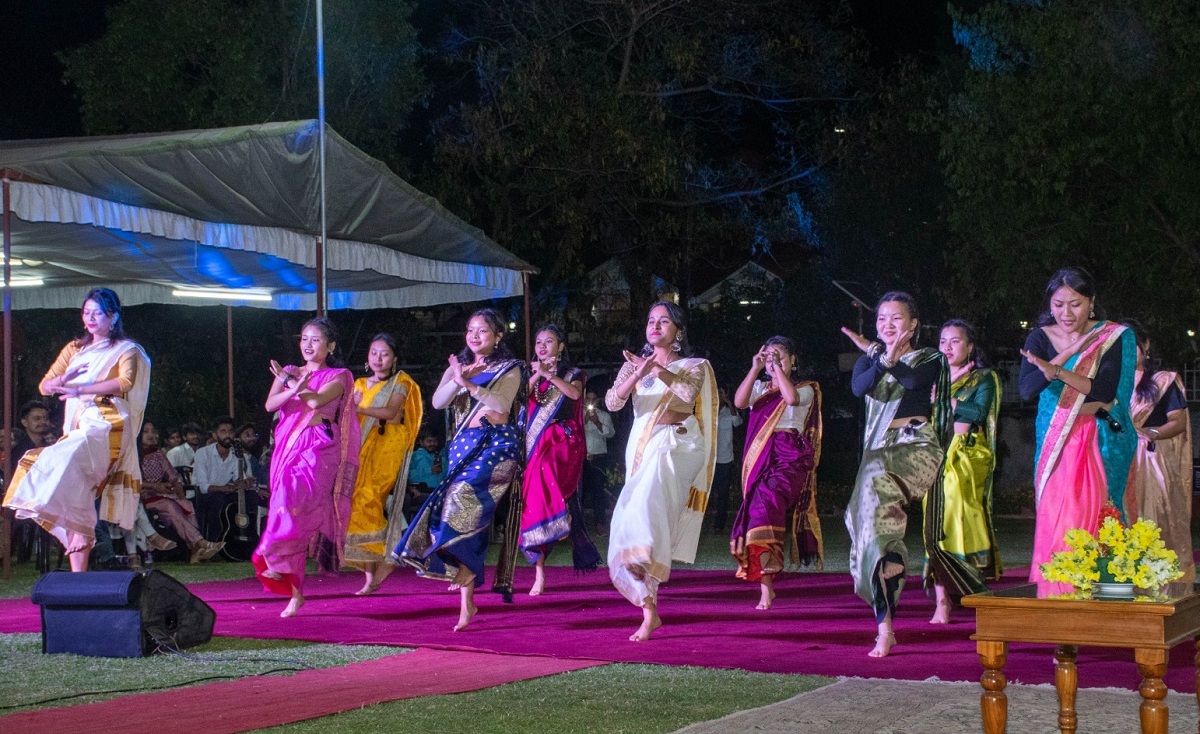Governor Dr. Hari Babu Kambhampati graced the celebration of Ugadi, Gudi Padwa and Bihu as the Chief Guest at Raj Bhavan, Mizoram. The Governor expressed his delight at being able to celebrate the occasion of ‘Ugadi’, a traditional festival signifying the beginning of a new era and a fresh start. He noted that the festival, being a symbol of spring and rejuvenation of nature is therefore observed with various rituals and customs such as the practice of wearing new clothes, decoration of houses with mango leaves and rangolis, preparation of festive meals, prayers, offerings, greetings and blessings. He mentions that this day is also celebrated in Maharashtra as ‘Gudi Padwa’ which marks the first day of Marathi new year, characterized by the hoisting of Gudi Flags symbolizing victory and prosperity. He also noted the similarity of these festivals with the upcoming Bohag Bihu festival of Assam, also called the Rongali Bihu that is to be celebrated on April 14th, which too heralds the onset of spring and the Assamese New Year.
The Governor, from these festivals, shares his observation that India celebrates various harvest festivals across different regions, each with its own unique customs, traditions, and significance such as the Baisakhi festival celebrated in Punjab, Haryana, and Himachal Pradesh, Mesadi of Karnataka, Pana Sankranti of Odisha and Vishu, a celebration of the Malayali New Year in Kerala and Tamil Nadu. He then remarked on the uniqueness of the celebration held tonight in that it is an inter-cultural regional festival and hence is therefore an apt reminder that beyond the borders of customs, language, and religion, we are all part of one nation, sharing a commitment to building a country where we can not only break the boundaries of our differences but rather celebrate our cultural differences together. Ugadi also known as Yugadi is primarily celebrated in the states of Andhra Pradesh, Telangana, Karnataka, and Maharashtra. The word ‘Ugadi’ is derived from two Sanskrit words – ‘Yuga’ meaning era or age, and ‘Adi’ meaning the beginning. This festival is a time of joyous celebration, symbolizing the onset of spring and the rejuvenation of nature.
Central to this celebration is ‘Ugadi Pachadi,’ a unique dish made with six different tastes – sweet, sour, bitter, salty, tangy, and spicy. This unique blend of flavors each represents a different experience of life. It includes: jaggery – symbolising happiness; tamarind – symbolising challenges; neem flowers – signifying bitterness; raw mango – depicting surprises; salt – denoting fear; chilli – signifying anger. The complementing flavours in Pachadi resulting in a flavorful dish is representative of the complementary nature of all the experiences in our lives. It is a dish reminding one to embrace the entirety of our life journey and welcome the New Year with open arms. It is believed that whatever happens on this day sets the tone for the rest of the year. Gudi Padwa also known as Samvatsar Padvo marks the beginning of harvest season in Maharastra and is one of the most important Hindu festival observed in Maharastra and Goa by Marathi and Konkani Hindu people. It is celebrated on the first day of Chaitra month which marks the starting of Marathi New year.
Gudi Padwa is a combination of two words- ‘Gudi’ meaning flag or emblem and ‘Padwa’ meaning first day of Chaitra Shukla Paksha also known as Pratipada Tithi. This festival is accompanied by a delicious spread featuring Puran Poli and Shrikhand typically enjoyed with family and friends. Rongali Bihu also known as Bohag Bihu is one of the most significant and important festivals in the the Bihu calendar of Assam celebrating the arrival of harvesting season while also marking the first day of Assamese New Year. The word ‘Bihu’ is derived from ‘Bishu’ in Sanskrit, which means “to ask the Gods for prosperity during the season of harvests. The festival is celebrated for seven days with great enthusiasm and joy. This programme witnessed a diverse and enthralling display of traditional dances and performances such as – Kuchipudi Dance, Telugu Fusion dance, Bihu dance, Bodo dance, Assamese dance, Marathi fusion dance, Bharatnatyam Dance, Bhangra dance and Punjabi dance performed by students from PUC, MZU, RIPANS and Assam Rifles. Apart from this, beautiful performances such as- Medley Dance, Bollywood song, Tollywood Dance and Tlang lam dance were performed by students of MZU and Hrangbana College.



















+ There are no comments
Add yours